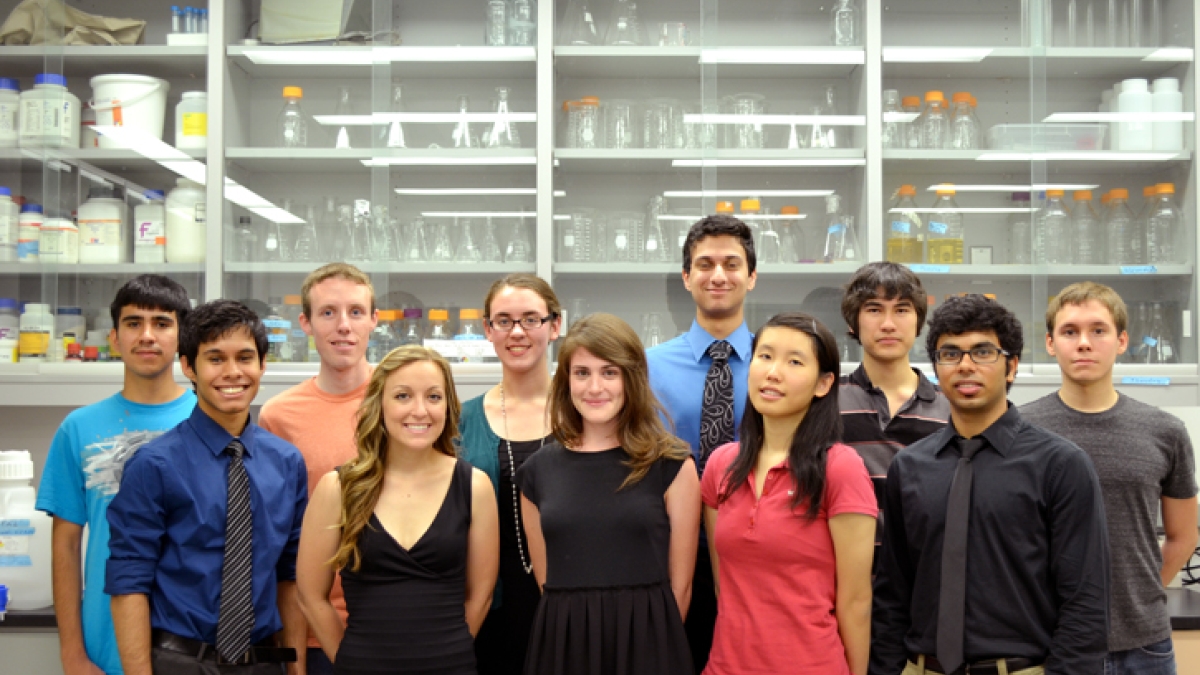ASU team vying for shot at synthetic biology championship

A team of nine Arizona State University students is participating in the premiere student competition in synthetic biology.
The ASU squad will be at the America-West Regional Jamboree for iGEM – the international Genetically Engineered Machine competition – at Stanford University, Oct. 12-14.
Teams there from throughout the western United States and western Canada will be vying to advance to the iGEM World Championship Jamboree.
Winning teams from five regional rounds will gather in November at the Massachusetts Institute of Technology (MIT) for the international round of the championship competition.
The ASU team members competing at Stanford are: biomedical engineering majors Abhinav Markus, Ethan Ward, Amanda Ispas, and Khateeb Hussain; chemistry and biochemistry majors Ryan Muller and Ellen Qin; biochemistry major Rohit Rajan; anthropology major Madeline Sands, and Nisarg Patel, who is majoring in political science and molecular biosciences and biotechnology.
The iGEM contest challenges students to design and build simple biological systems. The ASU iGEM team is developing portable low-cost biosensor systems to detect pathogens in water supplies. Pathogens are organisms that can cause disease in other organisms, including humans.
The team is focusing on two sensors to detect the pathogens that can cause diarrhea. Diarrheal disease is among leading causes of death among children under the age of five, killing as many as 1.5 million each year worldwide.
One of the team’s sensors will detect pathogens through DNA identification. Another will detect water contamination by examining if certain kinds of proteins are attached to the membranes of bacteria, indicating the presence of pathogens.
In 2011, the team earned a bronze medal in the regional iGEM event – not enough to move to the next level of competition.
“We are hoping that this year we will show improvement and gather enough momentum to get a silver or gold medal and advance to the world championships,” says Karmella Haynes, the team adviser and an assistant professor in the School of Biological and Health Systems Engineering, one of ASU’s Ira A. Fulton Schools of Engineering.
Haynes, who is also an iGEM competition judge, explains that teams can earn a gold medal by standing out in various ways. Those include demonstrating advances made in a project submitted in a previous year’s competition, helping other teams by sharing work or concepts, or considering the impact their project could have once it is put into use in communities.
ASU’s iGEM team plans to emphasize the latter approach. “They are dealing with a system that can either tell people not to worry about something or to panic, and they need to consider how people will react when they are empowered by this system,” Haynes says.
The iGEM organization strives to develop unity among the competing teams. The standards to qualify for a gold medal are meant to encourage students to work together to develop ideas and find solutions. “We are trying to create a culture among students at a young age in which a sense of community is encouraged,” Haynes says.
The iGEM Foundation was established at MIT in 2003 and the competition began the following summer. The foundation has since become an independent nonprofit organization, and the competition has grown to include more than 165 teams from around the world.
The ASU team’s sponsors include the Ira A. Fulton Schools of Engineering, School of Life Sciences, Barrett, The Honors College and the School of Politics and Global Studies, along with the College of Liberal Arts and Sciences and its Department of Chemistry and Biochemistry.
Written by Natalie Pierce, Sandra Leander and Joe Kullman
Sandy Leander, sandra.leander@asu.edu
480.965.9865
School of Life Sciences

